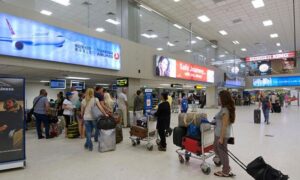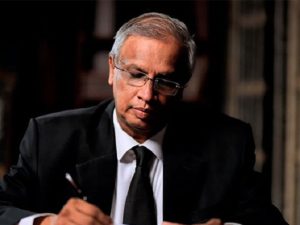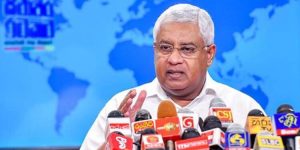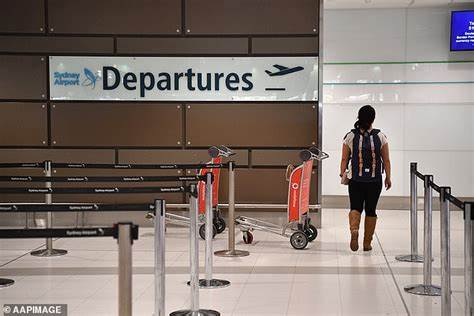Sri Lanka Suspends Electronic Visa Application Platform
 Sri Lanka has suspended an electronic visa application site managed by a consortium of companies including VFS Global, IVS, and GBS, following a Supreme Court order that halted the contract awarded without a competitive tender.
Sri Lanka has suspended an electronic visa application site managed by a consortium of companies including VFS Global, IVS, and GBS, following a Supreme Court order that halted the contract awarded without a competitive tender.
“We have been notified of certain interim orders issued by the Supreme Court of Sri Lanka today pertaining to the agreement under which this platform is operated,” a statement on the website’s front page announced. “In view of these orders, the website is suspended effective 2 August at 17:00 hours Sri Lanka Standard Time.”
Despite the suspension, the Department of Immigration continues to issue on-arrival visas physically to tourists from eligible countries, according to airport officials.
The court also reinstated the status quo that existed before April 18, when the site was operated by Mobitel, a domestic company. Mobitel had been charging one dollar for the service, whereas VFS Global charged varying prices ranging from 10 dollars to 18.5 dollars or more, depending on the category of visa.

Appearing in person, Mr. Sumanthiran sketched out the history of the electronic travel authorisation platform (ETA) which was first introduced at the end of 2011 with SLT-Mobitel, a government-controlled entity, which ran the system. The counters, however, were manned by officials of the Department of Immigration and Emigration.
This was deemed to be a pioneering system across various airports, despite teething problems that were later resolved. From time to time (and especially in 2022-23), Mobitel suggested to the Immigration Department that the system needed an upgrade. Cabinet approval was subsequently granted and a Cabinet-appointed negotiating committee set up.
While this was in progress—and after Mobitel implemented nearly 50 percent of the revamp at an estimated cost of around Rs. 10 million—a supervening event took place whereby some unknown entities submitted an unsolicited bid to the Ministry of Public Security.

Public Security Minister Tiran Alles requested Cabinet clearance to appoint a committee to study the proposal’s suitability. This committee made several observations, including “very seriously negative” ones about the deal, the SC was told. Nevertheless, Minister Alles submitted a further Cabinet memo to sign this outsourcing agreement with VFS and its partners, subject to the observations of the committee.
Finance Minister Ranil Wickremesinghe said he had no objection to the contract in principle, but instructed that the advice of various oversight institutions, including the Attorney General, be obtained. The AG gave its opinion only on the agreement it had been asked to vet while pointedly declining to comment on the manner of selection of the companies or financial implications. This, Mr. Sumathiran said, “speaks volumes.”
The AG also commented on the need to check the juristic personality and provenance of these companies and pointed out that, although the Public Security Ministry’s initial Cabinet memorandum had justified the project, saying, among other things, that there would be an outlay of US$ 200 million by the entity, the outsourcing agreement glaringly had no mention of this promised investment, Mr. Sumanthiran said.
Additionally, Mobitel was granted just eight hours to shut down its operation by order of the Public Security Ministry—no reasons were given in the relevant email—despite its agreement with the Immigration Department stating it cannot be terminated purely for convenience.
This was a backroom deal for which no procurement process was followed, Mr Sumanthiran concluded.
Two companies that did not exist
In his submissions, Mr. Hakeem pointed out—as Mr. Sumanthiran had done—that Minister Alles’ initial Cabinet memorandum had referenced two companies “which did not exist at all”. Despite all relevant searches, these entities did not exist as juristic persons anywhere in the world.
It was when the AG had also pointed to the proposal’s various problems that the Public Security Minister changed the names; and the outsourcing agreement was signed with two companies registered in Dubai and Singapore that had entirely different names.
Even where the two new companies were concerned, Parliament’s Committee on Public Finance, which also did registry searches, could not find their beneficial owners as the shareholders were various solicitors in other countries, aside from a solitary Frenchman. These entities are shell companies established for money laundering purposes, Mr. Hakeem told the Court.
Highlighting the financial aspect, he said that VFS’s own projection published in its proposal to the Public Security Ministry was that it would earn US$ 1.4 billion during the period of the contract. Nothing would come to the country. With US$ 1.4 billion, Sri Lanka could run three ministries and pay off the national carrier’s debt, Mr. Hakeem said.
“This is clientelism”
Mr. Ranawaka, also appearing in person, elaborated on the financial disadvantages to Sri Lanka of the outsourcing contract and said that, when deals like these were struck, it was not conducive to investment promotion and eroded the country’s credibility. This was a clear example of “sahacharawadaya” he said—referring to clientelism, which is a social order that depends upon relations of patronage (and a political approach that exploits this).
Sri Lanka, as a struggling nation, will never be able to extricate itself from financial morass if such practices continue, he stressed, adding that the country must generate dollar income to start repaying billions of dollars in loans. By crippling the tourism industry in this manner, we will be executing ourselves.
Sanjeewa Jayawardena PC spoke for petitioners Mr. Pethiyagoda and Mr. Jayaratne, pointing out that no procurement procedure had been followed. Even the recommendations of the committee that examined the suitability of the proposal were negative. The contract should not have been proceeded with on any consideration he said—with no procurement process, serious negative feedback, and companies of which the provenance was dubious and unproven.
The travel trade is pummelled
Although the government claimed the VFS deal was “zero cost” to the State, there was, in fact, a serious cost, said Suren Gnanaraj, counsel for SLAITO. The tourism trade, which was devastated by sequential crises, has been crippled again by the VFS deal. There was a “significant” drop in arrivals, he told the Court. He also questioned the manner in which the large convenience fee charge from each visa applicant—nearly US$ 25—was routed through an account in Dubai.
Additionally, the agreement was signed by the companies and the Controller General of Immigration. This cannot be done, Mr. Gnanaraj insisted, as this individual had not been authorised by Cabinet to sign a contract that was binding on the Government of Sri Lanka. It was therefore null and void.
By law, the VFS joint venture cannot be given the power to issue visas to all travellers to Sri Lanka, observed Senany Dayaratne, counsel for TISL and Pulasthi Hewamanna, its chair. Regulations promulgated in 1956 under the Immigration and Emigration Act give a list of prescribed authorities that can issue visas—all of whom are public functionaries. Authority is not assigned to private companies, much less to foreign private companies. What was done was completely illegal, he said, and how the Cabinet could have missed it.
The immigration counters of an airport were the first line of defence of any nation. Because of a backdoor deal, however, foreigners were placed at the first line of defence in Sri Lanka, resulting in the siphoning out of money, and in national and traveller security being compromised while earning nothing for the country.
Speaking for petitioner S. M. Dissanayake, Dilrukshi Dias Wickremesinghe PC, strongly highlighted the various deficiencies in the outsourcing agreement, including the fact that the companies were dubious. She also pointed to the nebulous dispute resolution mechanism in the contract.
Upul Jayasuriya, PC, appearing for Mr. Abeysinghe, drew attention to the negative feedback of the committee that studied the proposal, including the danger that confidential diplomatic and foreigner information will go to third parties.
The AG’s Department objected to any interim relief being granted. It maintained that there was no evidence of the Mobitel contract having been terminated; that the procurement process had been duly followed, despite this having been an unsolicited bid; and that the VFS deal suited the need of the time.
The case was fixed for argument on October 7 and 8, 2024, with parties to file objections, counter affidavits and written submissions before that, on the given dates.
There is no immediate information on when the old site will be restored. Department sources indicated that a decision is likely to be made next week







